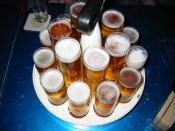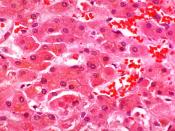How does alcohol affect the human body?
Alcohol affects the whole body and does not just cause the drinker to act drunk. Every part of the human body responds when alcohol is present in the body.
The brain is affected by alcohol with impairment in behaviour, judgement, memory, concentration and co-ordination as well as mood swings and emotional outbursts.
The Central Nervous System is sedated by alcohol and the ability of the nerve cells to respond is damaged. Sleep, anaesthesia, respiratory failure, coma and death may follow large doses of alcohol.
Alcohol weakens the heart muscle and ability to pump blood, causes irregular heart beats, increases blood pressure and the risk of heart attack and strokes as well as inhibiting production of white and red blood cells.
Alcohol lowers the lungs resistance to infection and high amounts of alcohol may cause breathing to stop.
Muscles become weaker and atrophy, pain, spasms and tenderness occur from alcohol misuse.
The liver is one of the most effected organs from the use of alcohol. Alcohol causes the liver cells to inflame and die, preventing the liver from working efficiently and only has time to repair itself if alcohol is taken only in small amounts or infrequently.
Drinking alcohol can irritate the stomach and cause sickness and pain including irritation of the stomach lining, peptic ulcers, cancer, bleeding lesions and inflammation.
The intestines are affected by alcohol with inflammation, ulcers and cancer, nausea, diarrhoea, vomiting, sweating, loss of appetite and the inability to process nutrients and vitamins.
Alcohol interferes with the body's ability to absorb calcium resulting in bones being weak, soft, brittle and thinner.
The conclusion I make is an obvious one of the fact that alcohol affects many parts of the human body and the statement that 'alcohol has no effect...


